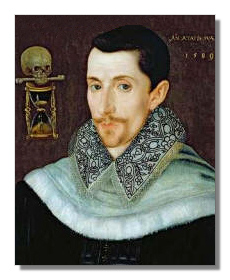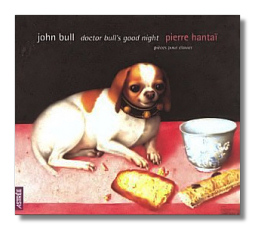
The Internet's Premier Classical Music Source
Related Links
-
Find CDs & Downloads
Amazon - UK - Germany - Canada - France - Japan
ArkivMusic - CD Universe
Find DVDs & Blu-ray
Amazon - UK - Germany - Canada - France - Japan
ArkivMusic-Video Universe
Find Scores & Sheet Music
Sheet Music Plus -
Recommended Links
Site News
John Bull

(c. 1562 - 1628)
Bull was an English organist and composer, renowned for his knowledge of strict counterpoint. He was probably born in Hereford, where he obtained the post of organist at a young age. He quickly advanced to the positions of Gentleman of the Royal Chapel, and then organist of the Royal Chapel, by the age of twenty. In 1610, Bull was named the chief musician of the musical Prince Henry, a highly prestigious position in English music. In 1613, Bull permanently and mysteriously left England to live in Belgium, eventually becoming organist at the Anvers Cathedral. There he would have met his continental colleages, Pieter Cornet and the co-expatriot Peter Philips. Bull was one of the most knowledgeable theoreticians of his day, but his influence on the continent is hard to gauge. It does appear that he relaxed his own style under the influence of the more genial Pieter Cornet. However, these late works still show Bull's flair for counterpoint.
Bull's surviving music includes consort and keyboard compositions. Some of his keyboard music was published in the famous volume "Parthenia" (1612/13) along with that of William Byrd and Orlando Gibbons. Bull's compositions include elaborate counterpoint and virtuoso passage-work. His keyboard music tends to be most idiomatic on the organ, and is among the most demanding organ music ever published. There is speculation that Bull intended some of his organ music to be performed on equally tempered instruments, and indeed its wild modulations would seem to demand either these or a keyboard with more than twelve notes to an octave. Bull also left a substantial number of complex canons, notated in open score; these are among the most complicated examples in the genre, including those of Johann Sebastian Bach. Though sometimes accused of empty virtuosity, Bull's elaborately constructed music can be highly effective, if the performer is able to meet its rigid demands. The enigmatic "Dr. Bull" – as he signed many of his works – was one of the most unusual and unparalleled composers in Renaissance music. ~ Todd McComb (6/94)
Recommended Recordings
Keyboard Works
- Dr. Bull's Goodnight, In Nomines, Fantasias, Pavans, Galliards, etc./Astrée Naïve E8838
-
Pierre Hantaï (keyboards)
- Walsingham Organ & Keyboard Works/Dabringhaus & Grimm MDG3411258-2
-
Siegbert Rampe (keyboards)
- Pavans And Galliards/BIS CD-729
-
Joseph Payne (keyboards)
- Walsingham; Chromatic Pavan and Galliard "Queen Elizabeth's" with Farnaby/Guild GMCD7233
-
Derek Adlam (keyboards)














